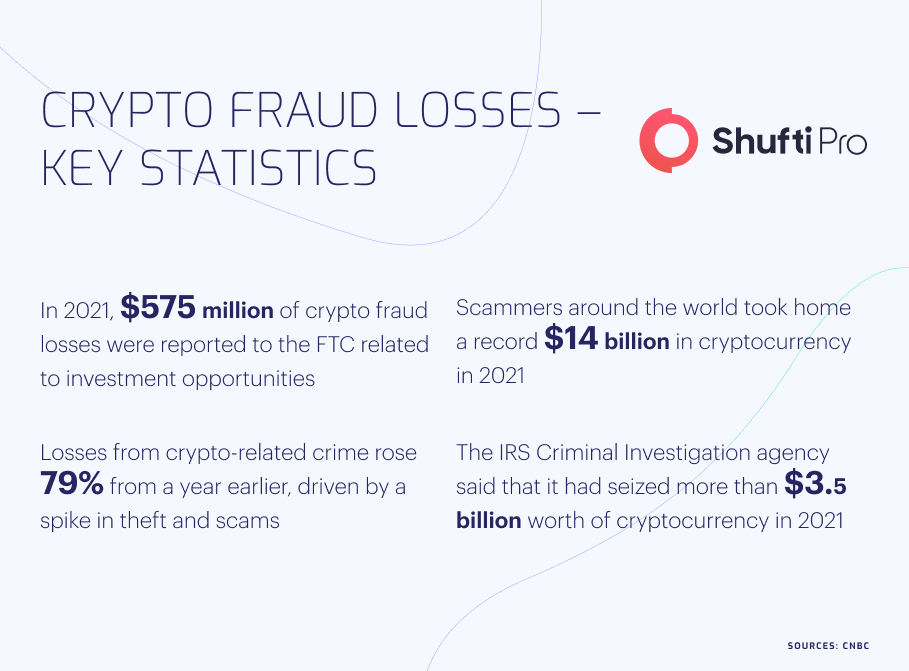Ensuring KYC/AML Compliance In Cryptocurrency Firms – The Role of Shufti

With emerging technologies in the financial industry, cryptocurrency is picking up the pace, and investors prefer to multiply their money through this new industry. Although cryptocurrency still has a long journey to replace fiat currencies, it contributes a lot to the monetary system, which has changed the whole economic system. A large number of online service providers accept cryptocurrency as a mode of payment, and people are extensively using such platforms. Besides this, many companies across the globe have started paying their employees’ salaries in crypto, which is denting the use of fiat currencies.
In 2021, the overall size of the crypto market crossed $3 trillion, with an expectation to increase in the coming years. This massive influx of revenue in the crypto sector has encouraged criminals to participate in fraudulent activities by getting involved in money laundering, terrorist financing, and other monetary scams. Besides the fact that the market is growing with the passage of time, the authorities are not putting serious efforts into regularizing it, which has created a lot of loopholes in the whole system. Implementation of identity verification and Anti-Money Laundering (AML) screening solutions can help the crypto firms to counter the prevailing crimes and put the culprits under the law.
Crypto Firms – The Hub of Financial Crime?
In order to understand the increasing crime percentage, it is critical to know about the mechanism behind cryptocurrency. All the crypto coins are working on Digital Ledger Technology (DLT) principles, which is entirely a decentralized system without a single authority. This is the point that helps the criminals to disguise their original identities or register at platforms using stolen details, and once they onboard the system, it becomes quite challenging to track them due to the decentralization. So, the most viable solution for this sector is to counter the fraudsters during the onboarding and report them to law enforcement authorities.
In 2021 alone, $3.2 billion of cryptocurrency was stolen, which is 72% more compared to the loss in the previous year. All the global financial watchdogs have also highlighted the vulnerabilities of crypto exchanges to money laundering and terrorist financing while instructing all the member countries to comply with the guidelines countering the bad actors in the system. Although the year 2022 is not going well for cryptocurrency as the overall value of all the coins, including Bitcoin and Ethereum, has fallen to their lowest, the experts predict that it will pick up the pace soon. While it will be back on track in the coming time, criminals will also be participating more vigorously in fraudulent activities. So it is the most appropriate time for the crypto exchanges to invest in the Know Your Customer (KYC) and AML measures to help combat all types of financial crimes.

How Law Enforcement Authorities are Working to Counter Criminals
Due to the increasing crime ratio and pressure mounting by the global financial watchdogs, all the major jurisdictions are working efficiently to address the challenge of money laundering through crypto firms. China, USA, Canada, and Europe are the major regions that are affected by cybercrimes and several cases have been witnessed in these countries, which shows the commitment of law enforcement authorities toward countering bad actors.
Gang of Eight Criminals Arrested for $100 Million Crypto Scam
During an international investigation, the UK Police arrested a gang of eight criminals who were involved in hacking celebrities’ crypto accounts and stealing the funds. The UK’s National Crime Agency (NCA) has stated that fraudsters were engaged in these activities for many years, and during this time, they managed to steal $100 million out of different accounts. The NCA has not revealed the name of the celebrities and mentioned that cases had been registered on all the criminals, and the court will be deciding their fates.
Fraudsters Convicted for £21m Loss in Cryptocurrency
Four offenders were convicted in the UK who were found to be responsible for fraudulently obtaining and laundering Bitcoin worth millions of pounds from an Australian-based cryptocurrency firm. During the investigation, the law enforcement authorities raided a place suspected to be the residence of criminals and seized illicit cash and gold. The court and Police have convicted all the fraudsters and warned all criminals involved in illegal activities.
FATF’s Role in Regularizing the Crypto Firms
The Financial Action Task Force (FATF) is the leading global watchdog that is working to address the challenge of money laundering and terrorist financing. Since 9/11, all the major jurisdictions have implemented stringent regulations under the light of FATF’s guidelines which has helped law enforcement authorities a lot in countering criminals. It is just more than a decade since cryptocurrency has come into the mainstream, and in a few years, it has attracted the attention of global watchdogs.
FATF has termed virtual assets to be a lot of beneficial for users but is also exposed to risks of money laundering and terrorist financing. Along with other global organizations like G20, FATF has formed a joint comprehensive framework and issued guidelines. It has made binding for all the member states to implement identity verification and anti-money laundering measures to counter criminals while onboarding. FATF has collected the data of money launderers in the form of sanctions lists and instructed all the crypto exchanges to screen their users’ data against these lists and report the suspected ones to local law enforcement authorities.
Balancing KYC/AML Compliance in Crypto Exchanges
KYC is a process by which crypto exchanges can identify and verify the true identities of their users. The KYC process involves biometric verification and document authentication in real-time using several advanced techniques. Using an effective identity verification system, it becomes almost impossible for criminals to onboard the system using fake or stolen identities. So if the crypto firms go for the KYC approach, there will be strong chances that cybercriminals will be eliminated during the verification checks.
Moreover, AML screening is also a simple procedure that can help the cryptocurrency platforms to screen data of their new and existing users against the global sanctions and Politically Exposed Persons (PEPs) lists and report the criminals to law enforcement agencies, restricting their access to the system. Incorporating KYC/AML measures will not only help the crypto platforms counter the criminals but also make them a secure place for sophisticated investors.
How Shufti Can Help
Combating money laundering, identity theft, and terrorist financing is quite crucial for the crypto industry. Right now, the sector is witnessing a big recession, making it the perfect time for exchanges to invest in KYC/AML measures.
Shufti’s KYC identity verification services are the perfect solution for crypto firms to help them verify the users’ true identities. Furthermore, the AI-powered AML screening solution by Shufti has access to 1700+ sanctions lists and screening data against them; it provides results in seconds with a ~99% accuracy.
Would you like to get more information about KYC/AML solutions for crypto firms?

 Explore Now
Explore Now













